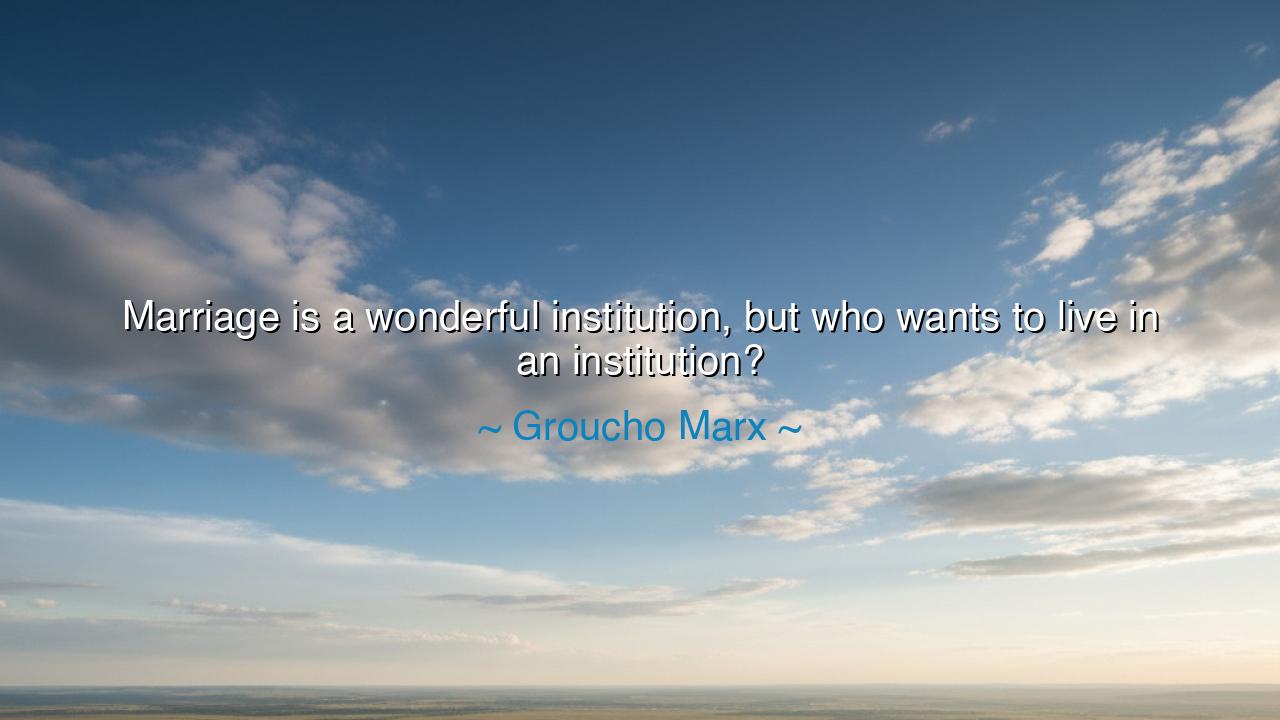
Marriage is a wonderful institution, but who wants to live in an






When Groucho Marx said, “Marriage is a wonderful institution, but who wants to live in an institution?” he wielded his weapon of choice — humor — to strike at one of the deepest paradoxes of human life. In this jest lies both mockery and wisdom. With laughter, he exposes the tension between freedom and commitment, between the wild spirit of individuality and the ordered structure of marriage. For an “institution,” though noble in purpose, is also a place of rules, of boundaries, of roles defined. And so, through wit, Groucho hints at an eternal truth: that love, when caged by duty alone, can lose the very spontaneity that gave it life.
In the style of the ancients, we may hear in his words the echo of a philosopher disguised as a jester. The ancients knew that truth, when veiled in laughter, could reach deeper than sermons or decrees. Groucho Marx, the great trickster of modern times, turns jest into revelation — for his joke is not a rejection of marriage, but a warning against its stagnation. He calls us to remember that love, to remain living, must not become a prison built by habit and expectation. An “institution” may protect, but it can also confine. It offers permanence, yet risks dullness; it sanctifies union, yet sometimes suffocates passion.
The origin of this quote lies in the golden age of comedy, but its roots stretch far deeper — into the very soul of human relationships. Marx, with his irreverent tongue, was speaking in an era when marriage was often regarded as duty, not delight; as permanence, not partnership. He saw that many entered it as a social command rather than a spiritual choice. Through his quip, he turned society’s solemnity into satire, asking, in essence, “Can something so structured still hold something as wild as love?” Thus, his jest becomes the philosopher’s mirror, reflecting how easily institutions — whether of state, faith, or family — can forget the heart they were meant to serve.
In this tension lies the wisdom of balance. For though Groucho mocked the structure of marriage, even he could not deny its beauty when lived rightly. To be married well is not to live in a cage, but to build a garden — fenced, perhaps, but full of growth. The danger is when love becomes law, when tenderness turns to obligation. The ancient poet Ovid, writing of love’s art, warned that affection cannot survive command: “Love is a voluntary flame; it dies when forced.” Marx, in his comic way, says the same: that love cannot thrive if it feels imprisoned, even by the walls of something meant to protect it.
Consider the story of Queen Victoria and Prince Albert, whose union, though royal and ceremonial, was filled with mutual respect and passion. They bore the weight of duty and public expectation, yet within that institution, they cultivated friendship and shared purpose. Albert’s death nearly broke Victoria’s spirit, proving that their bond had been more than ceremonial. In them, we see what Groucho, through laughter, challenges us to seek: a marriage that is not merely institutional, but alive with affection and choice. They lived within the walls of an institution, yes, but it did not contain their love — it amplified it.
Marx’s quip also reminds us that the spirit of rebellion is necessary to keep love from growing stale. Every marriage, no matter how noble, needs the spark of humor, the freedom to question, to laugh at itself, to resist becoming routine. Without that spirit, the “wonderful institution” becomes a monument — grand, perhaps, but cold. Humor, then, becomes a kind of wisdom in love. It reminds us that joy is not a luxury, but the lifeblood of companionship.
The lesson of this quote, when stripped of its jest, is simple yet profound: cherish structure, but protect freedom. Love requires both order and play — the discipline to stay and the lightness to breathe. Do not fear the “institution,” but do not let it harden into stone. Let marriage be a dance, not a cell; a covenant, not a chain. Keep laughter at its heart, for laughter renews affection and dissolves resentment.
So let Groucho’s jest live as ancient wisdom disguised in modern laughter: yes, marriage is a wonderful institution — but it must remain wonderful, not merely institutional. It should not feel like a sentence, but a song; not a rule, but a rhythm shared. For love, if it is to endure, must be both rooted and free — two souls walking side by side, bound not by walls, but by the joy of choosing each other, again and again, under the open sky.






AAdministratorAdministrator
Welcome, honored guests. Please leave a comment, we will respond soon